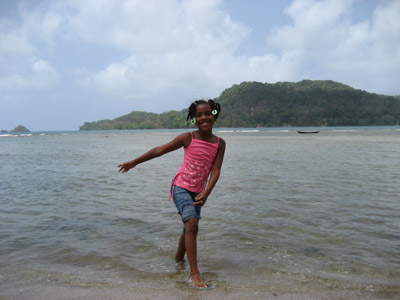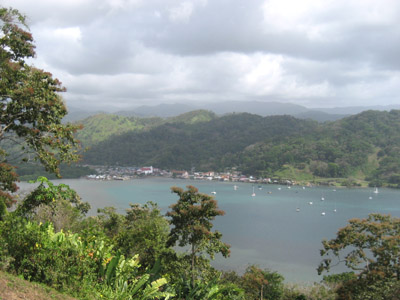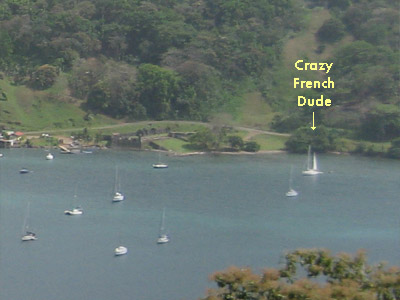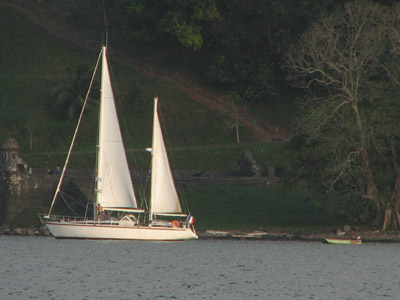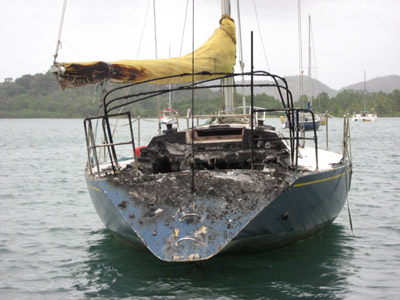Upwind Beat to Providencia
Saturday, March 17th, 2007We ran dark the first night out of Portobelo, not because we were worried about piracy (the area through which we were traveling was not a problem spot) but because our ten-year old batteries are pretty much crap. We maintained a night-long neurotic head swivel and the moment we spotted a ship’s running lights on the horizon, we snapped on our own nav light. Once the ship passed the light went right back off. We hoped we wouldn’t run into any other sailors with dying batteries.
The passage started out fairly rough, with stacked up wind waves interspersed with large weird blobby waves that piled up from the surrounding wavelets. These were steep and pointy and when we went over them, my stomach fell and the spice jars rattled around. It never ceases to amaze me that the boat just stays on top of that stuff, but I guess it is common knowledge that boats float and I really ought be used to it by now. By late afternoon, the winds calmed to a pleasant 12 knots and the seas miraculously followed and were mild enough to allow Joshua to cook something. We saw zillions of flying fish, tiny little blue guys that would erupt out of the waves in a swarm, gliding in all directions before the boat. I also saw my first Portuguese Man-O-War, a creature that looks more like a child’s toy than a dangerous stinging jellyfish. It resembles a clear plastic inflated empanada with a fluted purple-pink sail. We saw maybe seven or eight individuals on the trip to Providencia.
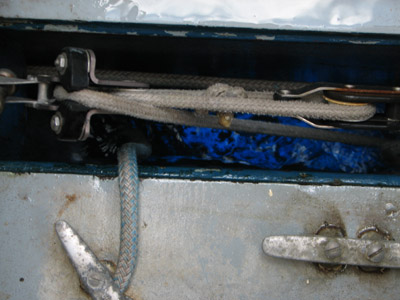
[Looking down the centerboard trunk at the water below the boat; the Caribbean is an amazing blue-violet color.]
We saw very few ships for our route, which passed directly in front of Colon and the Caribbean Panama Canal. Early the second morning, before the sun rose, I spotted a ship on my watch and flipped on the running lights. I took a bearing to see what direction it was running towards us: 70 degrees. A few minutes later I took another bearing and it hadn’t moved perceptibly. I became more neurotic and took bearings every 30 seconds—always the same. What this suggests is that the ship is on a collision course and would eventually come bashing into our boat unless something changes. Once the ship lights were clearly visible and it was still at 70 degrees, I woke Joshua up to check things out. We kept up on our course while trying to decide what to do: attempt to hail the ship, change our own course and hope the ship continues on its course, wait to see if the ship changes course on its own. We were just getting ready to tack when I noticed that the ship abruptly began to turn (I didn’t know they could turn so fast). It passed behind us, Joshua went back to bed, and I turned the nav lights back off.
It was Joshua’s birthday and when I woke from a nap, he had hauled aboard a large wahoo! It was again sort of rough and so he quickly hacked off a chunk to make some wahoo fried rice for breakfast. Wahoo is a very tasty fish it turns out and we had heard that they are supposed to be prime sport fish because they put up a fight, a sort of creepy concept. (Ours didn’t fight much since it took us a while to even notice that we had caught him.)
Towards the evening that day, we saw a ship again heading for us on a collision course (son-of-a-bitch!). It was a large white thing and Joshua thought it might be Coast Guard (possibly had a orange stripe on the side). I thought we might tack and pass behind it when it abruptly changed course and increased speed so that it was running directly for us, bow bashing into the large waves. I was reminded of the only other time I had any experience with US Coast Guard. We were kayaking around off the beach in Marina Del Rey and this large (well, 30 feet maybe, which is large enough to a kayaker) power boat charged us. We started waving our kayak paddles and I was trying to unfasten my life jacket in preparation to flip the kayak and dive deep to go under the propellers when the boat ran us down but at the last moment, it came about in a circle and just rocked us with a monster wake. As we looked after it we saw it was the Coast Guard, evidently just playing around; I was pretty upset. Joshua began to hail the white ship on the radio as I stood steering and freaking out in the cockpit. There was no answer and Joshua tried a second time. They seemed to be getting really close and were moving very fast. Finally they responded and identified themselves as the US Coast Guard. When the ship was very close to us, they abruptly turned, went behind us, and began to follow our boat. They asked for our boat registration numbers, our names, dates of birth, SSNs, home ports, destination, and where we were coming from. They told us to maintain course and speed. We did and waited. Finally they said that they were going to board us and conduct a “Code 41” check but were just waiting for the ‘OK’ from their boss. At this point, the sun was setting and it was growing dark. We said ‘okay’ and asked what 41 meant; they said it was a routine safety check to see if we had all required safety equipment aboard, check expiry dates of our flares, and to be sure we were operating safely out here in the Caribbean.

I wanted to reef because the wind was strong and gusty and the sea always feels worse when you can’t see it coming but we figured we should just maintain course and speed like the USCG told us and not do anything odd. The ship loomed over us and there were a number of people standing around on deck next to a very large cannon. I started taking bearings on the cannon to be sure they didn’t aim it at us.
The whole thing took around four hours. By the time they finally departed, we were exhausted, hungry, our watch schedule was all messed up, and we were worried that we would now not make it into Providencia before nightfall the following evening. After radioing at us repeatedly to “maintain speed and course,” they managed to deploy a large black inflatable, called “Sharkbite,” populated by large black-clad Americans sporting sidearms and bulletproof vests. It took them about thirty minutes to figure out how to board a pitching 32-foot sailboat in the dark, in heaving 8′ seas, underway at 6 knots, which is to say, we finally had to heave-to to get them aboard. Three came aboard, not gracefully, and did a preliminary inspection (checked to see how much water was in our bilge) “just to be sure that your boat is safe for our fourth crew-member uh Officer uh Parker and us to be aboard.” Uh Officer uh Parker miraculously turned out to be human and she was introduced as the ship’s artist charged with the task of sketching the interior of our little boat. The story was that they had never seen a trimaran before and the Coast Guard didn’t know anything about trimarans and it was so lucky that they spotted us out here and wouldn’t this be a great learning experience for everyone. A bizarre story, at best, but it wasn’t like we had a choice in the matter. It took them all of five minutes to do the Code 41 safety inspection, where they wrote down the expiry dates on our flares and noted how many life jackets we had aboard. Then they took three hours to go over our boat with a fine-toothed comb all the while reveling in the fantastic opportunity it was to be aboard a 70’s era trimaran; “space accountability” they put it when radioing back to the big ship. Sometime during the measurements, Officer Parker emerged from below and puked onto our ama. Then Officer Murphy went forward with the camera and blinded us all with the intense flash until she ran out of batteries making sure she got pictures of every single thing in our boat—she even took photos of the books on our bookshelves. She had to take pictures of the aft cabin by flashlight after that. Then they did some “ion” testing, which means they rubbed some special pieces of paper all over all the surfaces of the boat to be sent via dinghy back to the big white mothership, another death-defying maneuver during which Officer Murphy nearly fell overboard in the moments when she wasn’t in danger of having her arm amputated by the inflatable squeaking up against our hull. Murphy safely back in the overcrowded cockpit, they all stayed aboard making small talk while we waited to find out if we had any unsafe or expired narcotics aboard. There was much radio chatter during all this, most of which was in code, “Sharkbite’s got the IS and will RV with the OHS.” “COPY!” “How’s the RS?” “RS negative!” “COPY!” Etc. It all ended very abruptly when we got the call over the radio: “Officer Terry, you are One Hundred percent done with your safety check.” The de-barking procedure went fairly smoothly, that is to say it was at least in keeping with a level of safety I’ve come to expect from our Coast Guard friends: this time it was Officer Terry who nearly went overboard as one of the guys in the inflatable winced with obvious strain trying to steady the inflatable against our boat while we rocked about in the large waves.
“We don’t normally do this but…” Officer Terry handed us a plastic bag with a couple of Coast Guard T-shirts and everyone smiled and wished Joshua a happy birthday, then they bashed off into the night.
It was 9:30 pm and we ate some crackers before I went to bed. Joshua said that they continued to follow us for a couple hours before disappearing over the horizon. By the time I came on watch, the nav lights were back off and the night was pleasant.
We approached the island in the afternoon the following day and kept a few-mile distance as we skirted the surrounding reefs (our Providencia chart boasts a survey date of 1835). The island is mountainous with dry grasses and sparse trees here, green jungly foliage there, and palm trees along the water’s edge. The beaches are white and the waters calm around the island since they are mediated by the barrier reef. The Caribbean has a tidal change of around one foot only.
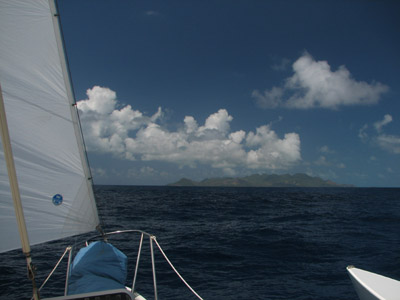
Once we were anchored, we radioed ashore to Mr. Bush, the man in charge of getting visiting vessels checked into Colombia; he and his crew turned out to be the friendliest and most expedient port/immigration authorities we have ever encountered. Afterwards, we sat in the cockpit gazing off at the lights onshore and the stars overhead. We made an elaborate cooked dinner featuring wahoo. We sipped wine and took out the Coast Guard T-shirts for a better look.
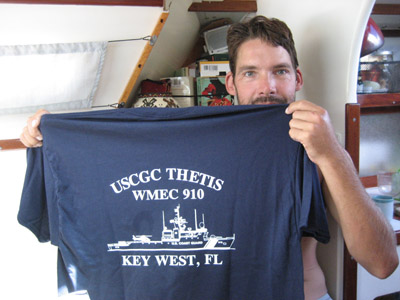
Not exactly my style but I sure as hell will be wearing mine the next time we get boarded for a routine safety check.
